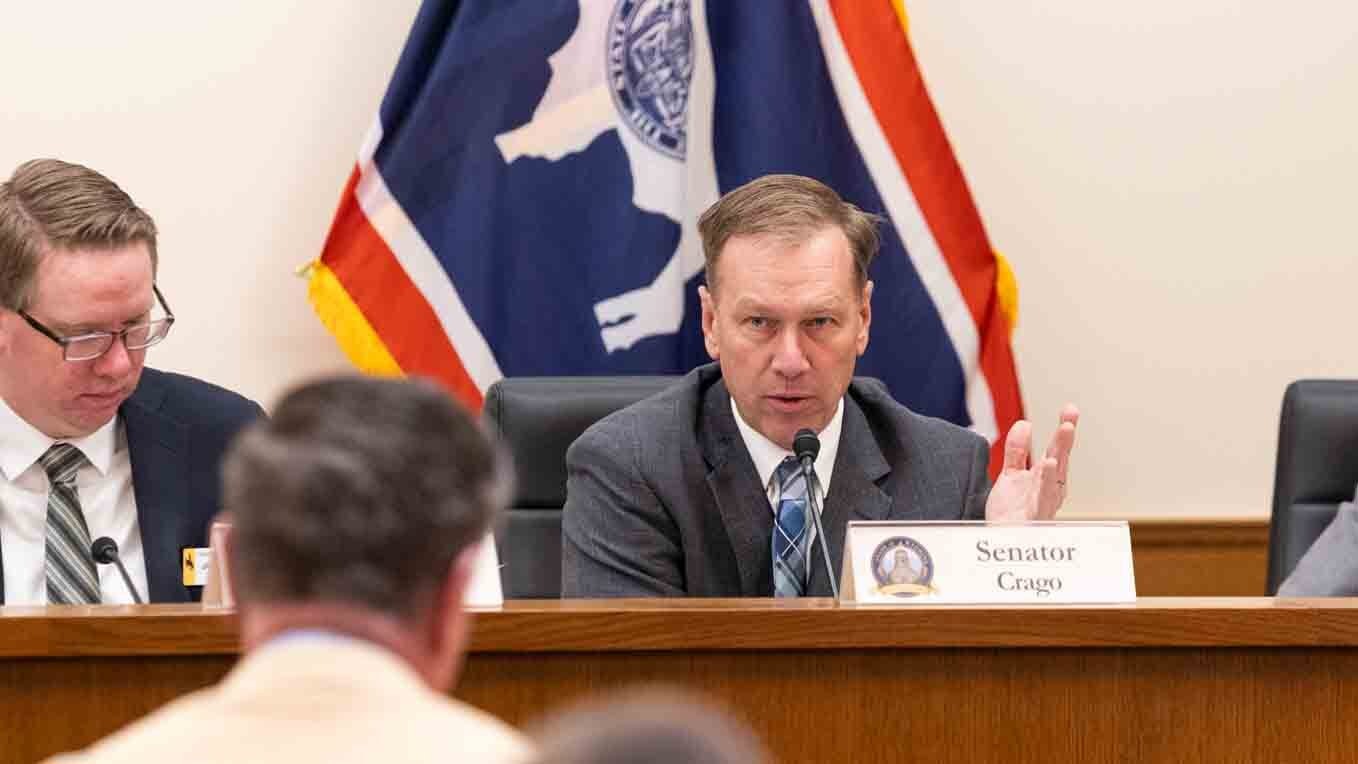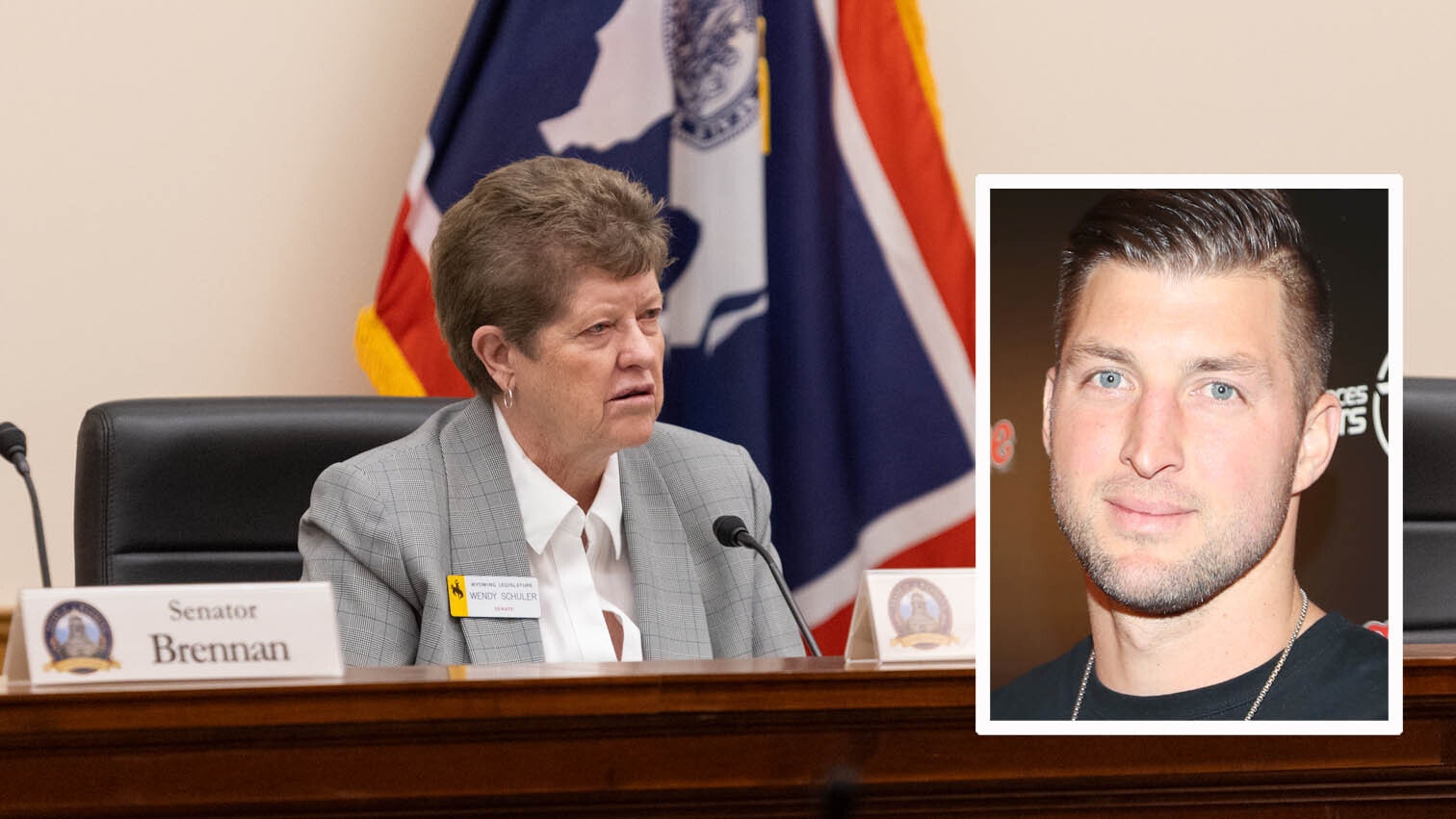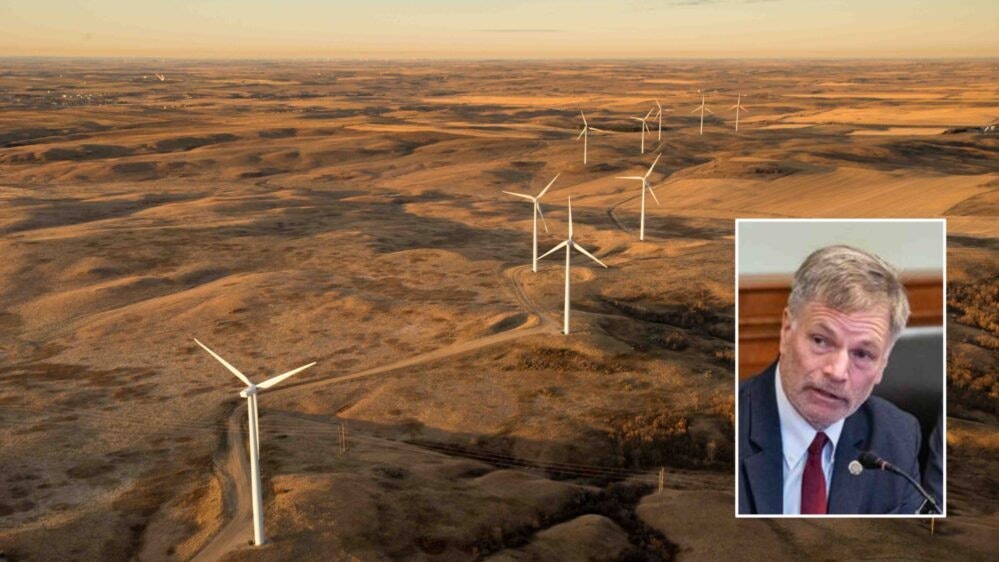CHEYENNE — Members of the Freedom Caucus-led House Appropriations Committee called an impromptu press conference Thursday during which they laid out several goals for the coming budget session.
While House Appropriations Chair Rep. John Bear, R- Gillette, repeatedly declined to give specific details, the conversation surrounded broad conceptual goals for the session, such as keeping state spending from outpacing Wyomingites’ paychecks. He particularly highlighted a desire to return to “pre-COVID” levels of spending.
Pressed by Cowboy State Daily to describe what pre-COVID spending looks like in a post-COVID world, Rep. Bear explained that he hopes the new budget reflects the same priorities as the state’s 2019 edition. That budget saw significant spending cuts due to decreased revenues and an influx of federal dollars to help support state agencies.
“We’d like to get back to that level before all the money came in and we made some changes since then,” he said.
Despite this, Rep. Scott Smith, R- Lingle, said the committee plans to temper its approach by prioritizing government services.
“Our ultimate goal is to continue the services that we have come to expect that are necessary functions of the government,” Smith said. “But also, we want to keep more money in the pockets of all the Wyoming citizens.”
Rep. Ken Pendergraft, R- Sheridan, said this approach may requires Wyoming to go without some “bells and whistles” that neighboring states have.
“We are, after all, a state of only 580,000 people,” he said. “The reason we don’t have a professional football team is we don’t have enough population to sustain it. So the fact that we live in a very small state population wise means that we might have to be a little bit cautious.”
Gubernatorial Grappling
This coming session will see multiple state agencies and service providers jockeying for crucial financial support from the legislature. That comes ahead of a ballot initiative proposing a 50% cut on top of the 25% cut last year.
Many local leaders including some county commissioners say the cuts limit the ability of Wyoming’s smallest jurisdictions to provide crucial government services.
Bear told Cowboy State Daily the committee would consider whether the state could give a portion of its sales tax income back to local governments to backfill these funds and lessen the burden.
The Senate rejected the proposed “backfill” provision during the prior session’s property tax discussions.
Bear also acknowledged some Republicans’ ongoing desire to make cuts in the Department of Health, which boasts the largest budget of any state agency. Pendergraft said he hopes these cuts will be balanced given the wide-reaching impacts the department has in Wyoming.
“As chairman of the subcommittee that’s looking at the Department of Health and their budget, we realize that every dime we touch affects somebody else,” Bear said. “You have to [make cuts] with as much discretion and as much compassion as possible.”
Bear during the press conference acknowledged that passing a budget this coming session will require cooperation with Gov. Mark Gordon, who possesses the power to line-item veto portions of the budget. Bear said the committee is looking forward to the governor’s budget proposal in November, which will outline his spending priorities and begin conversations around determining priorities.
“We have the governor’s budget coming to us,” he said. “We want to see what his ideas are.”
He criticized Gordon’s support of "corporate welfare," or endorsing public grants to certain businesses, however, and said the committee would look to curtail this spending during the session.
Not all House Appropriations members are affiliated with the Freedom Caucus.
Rep. Trey Sherwood of Laramie is a Democrat whose public-facing statements often emphasize small business and community initiatives.
Tax Breaks
Bear on Thursday also addressed the release of the Consensus Revenue Estimating Group report, which showed the state's investments outpaced projections by hundreds of millions of dollars with record-high investment earnings of $1.86 billion.
It is a historic highwater mark that outpaced mineral industries’ severance taxes and mineral royalties, Legislative Service Office staffer and CREG co-chair Don Richards told the Joint Appropriations Committee on Thursday.
It is not accurate to say, however, that the investment earnings out-earned all minerals-based revenues for fiscal year 2025, Richards told Cowboy State Daily in a follow-up email, since mineral producers also pay sales taxes, state royalties and ad valorem taxes.
The state’s spending policies direct much of those investment incomes into reserve accounts to act as financial cushion for leaner times.
Bear said at the press conference that this successful money management justifies giving Wyomingites a tax break.
“I don’t think that many families in Wyoming have been able to increase their savings by over 10%, which the state has been able to do in the last few years,” he said. “What did we do when we did that? We didn’t provide that tax relief.”
The committee also has its eyes turned on other forms of tax relief, such as potentially eliminating property taxes altogether over a 10-year period, Bear said. He explained the Freedom Caucus had commissioned a study which laid out a plan to reduce reliance on property tax dollars to fund local schools.
Property taxes fund local communities and school districts.
“Basically, the state will send a check to the county government to pay property taxes on behalf of the homeowners,” he said of his plan. “In a period of 10 years we can actually eliminate the property taxes that people pay for education. We’ll be doing it with the surpluses based on the spending cuts.”
Bear said he is fiercely in favor of property tax cuts due to complaints he has heard from constituents who own their homes but still view property tax as akin to being in debt to the government. He said this concept is antithetical to the vision of America’s founders.
“We believe that when you own property—and this is something our founding fathers really championed-- that America is different because of our ability to have private property,” Bear said. “When you have to pay the tax man for that right to maintain a private property well after you finish paying the bank off and own it supposedly outright, many people look at that as a rent.”
Property taxes could also be eliminated in favor of an elevated consumption tax under a separate plan. Bear said he directed the Legislative Services Office to engage with the Department of Revenue to begin studying how such a strategy could be implemented.
Bear cautioned, however, such a plan could backfire if used incorrectly.
“When you increase sales tax, it can affect the poorer communities, typically those in the middle of the state,” he said. “We’re concerned that if you increase the sales tax, but the people go to other states to purchase, so we don’t want to just approach this haphazardly.”
State Fire Response
In response to concerns that property tax cuts could hamper special fire districts throughout the state that rely on these dollars, Bear said his committee is aware of the issue and is working on a potential solution which would see the creation of a state-funded fire response arm.
“What we looked at this year was actually having a state component,” he said. “It’ll be a state-funded team, therefore many seasonal employees and a few full-time employees. What they will do is they will go and they’ll make the first line of defense to relieve those local firefighters."
While this idea is still in its early stages, Bear said such a team would provide sorely needed support to state fire mitigation efforts.
“We’re trying to shore up, rather than just sending more money out to local communities, to continue to do what they’ve been doing in a clear way,” he said.
Bear did not get into specifics about where such team would be based and how it would support the entire state.
Pass A Budget
Former House Appropriations member and legislator Clark Stith, a Republican of Rock Springs, told Cowboy State Daily in a Friday text message that it’s one thing for Bear and likeminded legislators to tout present and future cuts, and current revenues, but it’s another challenge altogether to pass a budget.
The Freedom Caucus didn’t take control of the House until 2025 when the legislature declined to pass a supplemental budget.
“The Freedom Caucus has never passed a budget – ever – so I don’t know what they would be taking credit for,” Stith said, who attributed the massive savings now filtering into reserve accounts to the work “common sense Republican legislators did through 2024.”
“During those times the Freedom Caucus was purely obstructionist,” he said. “It’s fair to say that the currently good financial position of the state happened in spite of the Freedom Caucus’ efforts to tear everything down.”
Correction - This story has been corrected to reflect that Co-Chairman Bear criticized Gov. Gordon over "corporate" not "public" welfare, meaning public grants to businesses. Rep. Ken Pendergraft said Wyoming has 580,000 people, not 508,000 as printed originally. And the Wyoming Freedom Caucus, not the legislative committee, has commissioned an economist for further study.
Jackson Walker can be reached at walker@cowboystatedaily.com.






